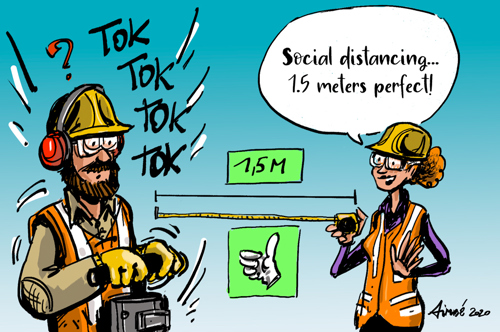- Employment Law
- Leila Mstoian - Ann Vranken
- corona , coronacrisis , labour regulations , teleworking , social distancing
As a result of the government measures to combat the spread of the coronavirus, many businesses are obliged either to introduce specific measures or to close down. This has a huge impact on the relationship between employers and employees and the way they carry out their work.
1. How should work be organised in times of corona?
1.1 Essential businesses
Business who have so-called essential activities, such as retail businesses (food shops, pharmacies, newsagents, petrol stations, fuel suppliers, etc.), private and public companies and services necessary to protect the vital interests and needs of the Belgian population (hospitals, police and fire services, postal services, etc.) are allowed to continue their activities.
The obligation to introduce telework does not apply to these businesses, but they are advised to do so as far as possible.
In any case, these businesses must also respect the rules of 'social distancing'.
This means that a distance of at least 1.50 m must be respected between each employee.
1.2 Non-essential businesses
All businesses with so-called non-essential activities are obliged to introduce teleworking for their employees for all jobs where this is possible, regardless of the size of the business.
For those businesses where telework is not possible, the employer must ensure that the rules of social distancing are respected. Below we will elaborate on the measures that you, as an employer, can take to this end.
Non-essential businesses that are unable to comply with this social distancing rule risk a hefty fine and even the sanction of the complete closure of the business.
One thing is clear, in the coming period a lot of work will be done from home.
2. Teleworking, what exactly does that mean?
Telework is regulated by law. In principle, an employee can only enjoy telework if there is a written agreement between the employer and the employee in which a number of mandatory statements and conditions are included. Telework can be organised on a structural or occasional basis. Depending on the choice, different formalities apply.
Now that the government has made telework compulsory during the corona crisis, it is not possible for most employers to comply with all these formalities. But we assume that in this exceptional situation "the need breaks the law".

3. Teleworking and employee's extra costs
Employees who have to work from home will suddenly face additional costs that are normally borne by the employer (e.g. office equipment, costs of internet, electricity, private use of computer and telephone, etc.).
The regulations concerning telework oblige the employer to intervene in the costs ("The employer must provide, install and maintain the equipment necessary for telework. He must bear the costs of communications and connections related to telework”).
The fixed costs (although capped) that are generally accepted are free of social security contributions and withholding tax.
The employee also benefits from luncheon vouchers in case of telework.
4. What measures should be taken to guarantee social distancing?
For the businesses where teleworking is not an option, 'social distancing' is the rule.
As an employer, the following measures can be taken to this end:
- Keeping distance, i.e. to avoid exposure to other persons within 1.5 metres;
- If the work organisation permits, a wider margin should be taken, otherwise at least 1.5 metres should be guaranteed;
- Demarcate zones or places using markings, ribbons or physical barriers;
- Explore possibilities of spreading the work over time during a working day;
- Spreading breaks, intermittent rather than coincidental;
- Limiting presence in spaces or places where groups of people are present (even if the minimum distance between them can be guaranteed);
- Isolated or secluded employment of employees as a temporary option;
- Create workspots in separate rooms occupied by 1 person;
- Use alternatives for meetings such as virtual meetings, training or work meetings using digital tools;
- Avoid greetings that involve body contact;
- Apply hygiene measures in abundance;
- Wear protective equipment if necessary;
- etc. …
Non-essential businesses that are not able to apply the rules of social distancing, must close for as long as the corona measures apply.
In addition of the “social distancing”-measures, the employer may take preventive measures (recommended by the World Health Organisation) and provide for their employees:
- Clean and hygienic workspots (such as desks, keyboards, door handles, etc.) by disinfecting them regularly;
- Hand disinfectants in visible places to promote good hand hygiene of workers;
- Good respiratory hygiene in the workplace by using paper handkerchiefs in case of coughing and sneezing;
- Good information so that the employees should avoid going to work with symptoms of illness such as cough and/or fever;
- Instructions in case someone gets sick and coronavirus is suspected (D) (F).
The Federal Public Service for Labour (WASO) has drawn up a checklist setting out these preventive measures.
They can be consulted by clicking here (D) (F).
This checklist is a list for self-monitoring based on the guidelines of the World Health Organisation, the guidelines of the National Security Council as well as the Welfare Act and the Codex well-being at work.
If you would like more information or assistance, please do not hesitate to contact us on +32 (0)2 747 40 07 or via CoronaTaskforce@seeds.law.


